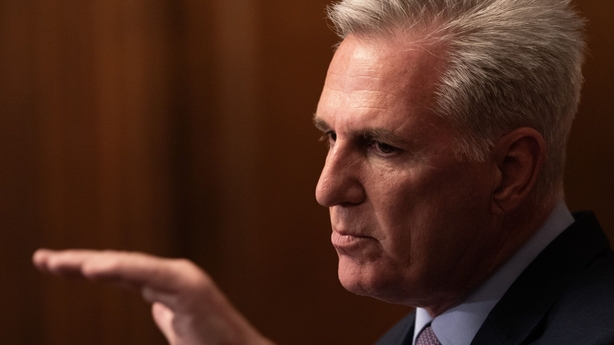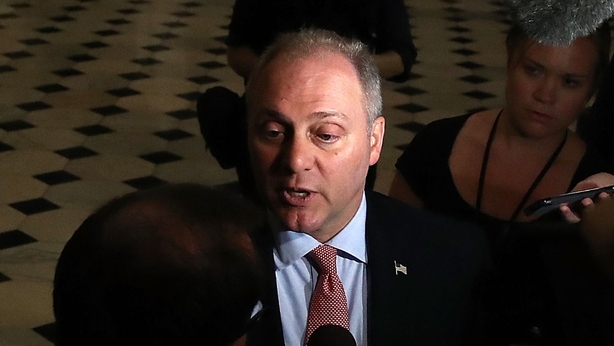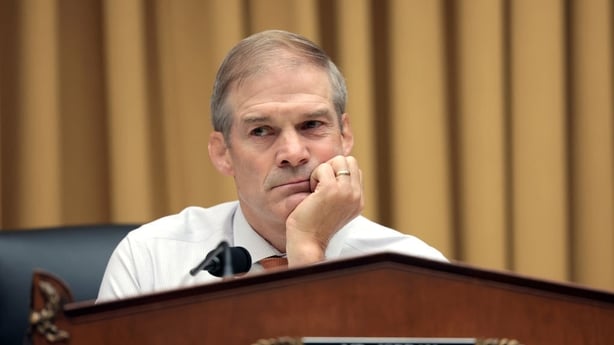There is a lot more at stake in the race to become the next speaker of the House of Representatives than who gets to bang a wooden mallet on a table.
For a start, there is a very big question mark over whether the US will continue to pay for the defence of Ukraine – and who wins the speakership could be decisive in precipitating or averting a staggering foreign policy reversal.
There is also the test of Donald Trump's strength in the battle for control of the Republican Party – which also has direct implications for Ukraine, Europe and the world.
Yes, of course, whoever gets to be the number three in the US political hierarchy matters at any time, but it especially matters, now because it has become a tipping point moment.
Last Saturday, Kevin McCarthy cut $6bn in funding for Ukraine from the compromise resolution to keep the US government funded for another 45 days.
He did this to appease a faction in the Republican Party that has long been sceptical of Ukraine.
It didn’t save him.

And there is a real risk that cut could become permanent, despite the fact that majority of members in the House from both parties are supportive of funding for Ukraine.
Because in the finely-balanced, hyper-partisan world of US politics, extreme factions can drive policy in ways that are the very definition of the tail wagging the dog.
Exhibit A: Tuesday, Kevin McCarthy became the first Speaker in the history of the United States to be booted out of office by his fellow Representatives. It only took eight of his fellow Republicans to side with the opposition.
The rhetorical onslaught was led by Matt Gaetz, a young representative from Florida, whose "take-no-prisoners" style is inimical to consensus-building politics.
There is plenty of talk in DC about the retribution the party will visit on him for what he did. We shall see.
The day after the vote, Mr Gaetz was interviewed on Bloomberg Televison, where he was asked about his attitude to funding for Ukraine.
He said: "The matter is somewhat settled now because in the Republican Conference, we have a rule called the Hastert Rule, which means that once a majority of the majority takes a position on a policy matter, you can't use a minority of the majority to roll them, and in the last vote on Ukraine, we had 101 Republicans vote in favour of that aid, 117 vote against.
"So it's sort of a settled matter that the House of Representatives is done funding the war in Ukraine no matter what."
Asked if he would vote for money for Ukraine if any other bill comes onto the floor of the House, Mr Gaetz replied: "Absolutely not. I've been voting against US involvement in this war for some time. I believe this war will end anytime the European democracies want it to."

Opposition to US money going to Ukraine has been building on the right of the Republican party for some time.
In the hour before the vote, a number of lawmakers spoke in the debate on Mr Gaetz’s motion to kick out Mr McCarthy.
Two of those who spoke in Mr McCarthy’s defence are now the leading candidates in the race to succeed him as speaker: Steve Scalise and Jim Jordan.
What they say about funding for Ukraine is important, and the election of either one of them to Speaker of the House could determine whether there is any more US money for Ukraine.
Mr Scalise would not welcome the description "establishment candidate", but when compared with Mr Jordan, he takes on many of the characteristics of one: well connected, owed favours by congressmen he has canvassed for (which is most of the Republicans), in a leadership position now – he is the majority leader in the House. He has experience, connections and credibility.
He is also a conservative. He has an A+ rating from the National Rifle Association for opposition to gun control, though he is the victim of a shooting himself.
He was seriously wounded by an anti-Trump gunman who attacked a training session of a congressional baseball team, and had to learn to walk again.

He is well regarded by conservative factions in the party. He remains a strong supporter of Donald Trump, and in the wake of the 2020 elections, refused to say that Mr Trump had lost.
His biggest problem is his health.
He is receiving chemotherapy for multiple myeloma that he disclosed publicly at the end of August.
Although professing the treatment is going well, he wears a facemask in the Congress buildings.
Last December, when Ukrainian President Volodymyr Zelensky addressed a joint session of Congress, there were dissenting voices, including Mr Scalise, then the Republican Majority leader in waiting, who told Politico he wanted to see greater scrutiny of the funds to Ukraine.
Asked if a Republican-led house would continue to fund Ukraine he replied.
"We expressed an interest in making sure the money is going to be scrutinised. That is something we will keep pushing for," he said.
Jim Jordan likes to be seen more as an outsider in Washington, a stance that is popular with some sections of the electorate, but is harder to maintain when running for the number three job in the Washington political hierarchy.
A former college wrestling star, and later on the coaching staff of the University of Ohio wrestling team, he relishes in a confrontational style which is on public view now in his position as Chair of the House Judiciary Committee. This is one of three committees that have begun an investigation into Joe Biden to see if there are grounds for an impeachment.

This was an investigation ordered by Kevin McCarthy and seen by some observers as yet another concession by Mr McCarthy to keep the right wing from turning on him.
Jordan is certainly more to the right than Scalise.
He was the founding chair of the House Freedom Caucus, the most right wing of the factions in the Republican Party in Congress. He continues as a vice chair of that caucus.
He lost an earlier election to become leader of the Republicans to Mr McCarthy.
He too is a strong supporter of Donald Trump.
According to the Report of the House Committee that investigated 6 January and efforts to overturn the 2020 Presidential election result, Jordan was: "a key ally and one of Mr Trump's most outspoken defenders, was a key player in the effort to invalidate the election results, and he refused to cooperate with a subpoena from the committee."
It received little co-operation from Jordan, writing: "the panel informed Mr Jordan in December 2021 that its investigators wanted to question him about his communications in the run-up to the Capitol riot, as well as his contact with Mr Trump on the day of the violence.
"On 5 January, Mr Jordan forwarded to Mr Meadows a text message he had received from a lawyer and former Pentagon inspector general outlining a legal strategy to overturn the election.
"On Jan. 6, 2021, Vice President Mike Pence, as president of the Senate, should call out all electoral votes that he believes are unconstitutional as no electoral votes at all - in accordance with guidance from founding father Alexander Hamilton and judicial precedence," the text read.
"Mr Jordan has acknowledged speaking with Mr Trump on 6 January, though he has said he cannot remember how many times they spoke that day or when the calls occurred," the report added.

Yesterday, Mr Trump returned the favour by publicly backing Jim Jordan for Speaker of the House of Representatives.
This sets up the power struggle within the Republican Party between Mr Trump and his supporters – who are probably a minority of the House Republicans – and Scalise, who probably starts with more natural supporters in the House than Jordan, but they have a track record of being overawed by Trump and his apparent power with the Republican Party base.
A Scalise victory for Speaker will not damage Mr Trump’s public standing, but may encourage party funders who would like to see anyone but Trump contest the 2024 election.
But a Jordan victory would be a real demonstration of Trump’s power inside the party, giving other candidates and potential candidates for 2024 pause for thought. Trump’s offer to become Speaker of the House for a 30-, 60- or 90-day period has to be seen in that context – not a serious offer, but an intrusion into the politics of the House Republican caucus.
Most of all, this contest for the upper hand in the Republican caucus would also pose a huge threat to Ukraine’s ability to continue to resist the Russian invasion, due to lack of funding and access to enough weapons
Trump himself has been deeply enmeshed in Ukraine for years, back to when he was President, with his personal lawyer Rudy Giuliani sending New York businessman Lev Parnas back to the land of his birth to dig for dirt on Hunter Biden – and, by extension, Joe Biden, his likely challenger in the 2020 election.

When Zelensky was elected President of Ukraine in 2019, Trump leaned on him to dig for more dirt on the Bidens, using the Ukranian state apparatus, and threatened to withhold weapons supplies to Ukraine if he didn’t co-operate.
This escapade led to Trump’s first impeachment in the House of Representatives in early 2020.
Rallying the Western world to support Ukraine has been held out as one of Joe Bidens big achievements as President – the ultimate demonstration of his "America’s back" policy of pulling back from the isolationist trend of the Trump administration.
A hobbling of that policy in the 12 months leading into the Presidential election could leave Biden looking like Jimmy Carter after the Iranian revolution and seizure of the US embassy in Tehran.
So, the stakes in this Speaker race are very high.
The delegation of US Congressmen attending the NATO parliamentary Assembly meeting in Copenhagen this weekend may well return to Washington with tales of having their ears bent by allies in Europe.
But will any of it make any difference in a Republican House Caucus that is in shock from the loss of its leader and beholden to the determination of a small but organised faction to assert domestic control through a destabilising foreign policy shift?
Things are moving fast. We may have most of our answers by Wednesday night.






